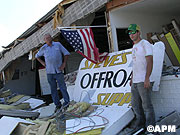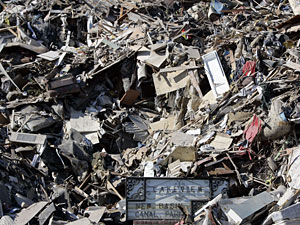Photos
More from MPR
| |||||||||||||||||||||||||||
Minneapolis, Minn. — Relief agencies estimate there are more than 3,500 evacuees currently in the state. Some of them arrived here immediately following Katrina. Others, like Paul Snyder, who's from a small town outside New Orleans, came to Minnesota several weeks later.
"I was in a trailer home and the light poles for the electric, they came down on the trailer," he says. "And there was a tree, it was hanging down from Katrina and then when Rita came, it fell down on the trailer."
Snyder stayed with some family for a while after his trailer home was destroyed. But Snyder says conditions were rough. There were long lines to get food. Gas prices were extremely high. Plus his living situation was too crowded.
"It was just about 15 people in the house just living -- family members," he says. "It was just rough. But I had a friend up here in Minneapolis. She was calling in and checking on me and she said that they were helping people in Minneapolis."
Snyder has been able to find help from one of the several offices supported by the Minnesota African American Hurricane Katrina Relief Collaborative. The group helped him find a job in the hotel where he's been staying for the last two weeks.
Snyder sought assistance at the group's office at the Sabathani Community Center. Workers like Kimtynia Alexander, directed him to a car dealership where he was able to buy a minivan for $500. Kimtynia Alexander is the office manager at the Sabathani site.
|
It was just rough. But I had a friend up here...She said that they were helping people in Minneapolis.
- Paul Snyder, who left Louisiana for Minneapolis after Hurricanes Katrina and Rita destroyed his home.
|
"It's been very busy here working with the Katrina survivors," she says.
Alexander estimates that she fields 50 to 75 calls a day from evacuees. Most are people trying to find jobs, housing and schools. But Alexander says sometimes she gets calls from people who just want to talk because they are feeling sad and depressed.
"It's very emotional," says Alexander. "I've heard a lot of stories, family stories and I've met a lot of people and I've talked to a lot of people. So it can get very emotional for me."
On Sunday, the group is sponsoring an ecumenical service at the Minneapolis Convention Center. Members of the Katrina relief collaboration, like Rev. Ian Bethel, say the upheaval in the lives of storm survivors has also created a need for help that only a higher power can provide.
"This effort that we have organized ourselves around will on this coming Sunday, make an attempt to bring our brothers and sisters back to their roots in their faith in God," says Bethel.
To reconnect people with their faith, Bethel says the collaboration thought it appropriate to invite some clergy who evacuees are familiar with. Among those pastors is Bishop Paul Morton, who presides over the Full Gospel Baptist Fellowship International. He is also the pastor of St. Stephen's Baptist Church of New Orleans.
"Greater St. Stephens in New Orleans is one church in three locations," he says. "Two of our locations are in pretty good shape and will be ready for the first Sunday in November. Our largest location in the east was totally destroyed."
Like many of the 20,000 members of the churches he leads, Morton lost his home in the floods that followed Hurricane Katrina. He says his flock has been scattered to more than 30 states, including Minnesota. Morton says he's travelling the country to minister to them and anyone else seeking spiritual guidance.
"Life is much more than things," says Morton. "A lot of people, their ultimate goal is get things, but when you lose everything, if you have hope -- and I'm taking around the country a message of hope -- to let people know that you can rebuild your lives and as long as you're alive, there's purpose. And when there's purpose, then you can fulfill that purpose that God has for you."
The Sunday Service at the Minneapolis Convention Center will feature a mass choir and a special collection. All proceeds will go to further Hurricane Katrina relief efforts.







